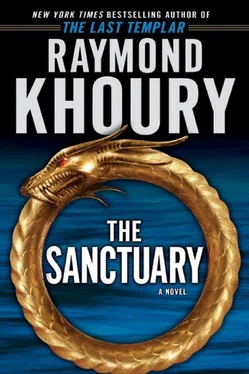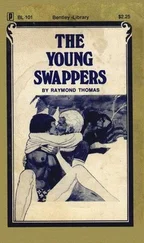“Jesus Christ,” Olshansky muttered. “What the hell did they do to him?”
“You probably don’t want to know.” Corben frowned. He heaved a frustrated sigh, imagining the scene unfurling in some underground rat hole.
The scream and the whimper were now gone, replaced by the same, annoying ruffle. Olshansky rubbed his face, shaking his head. He looked clearly shaken.
Corben let him have a moment of quiet. “What about the location?” he then asked, turning to the screen to his right. It showed a map of Beirut, overlaid by the boundaries of the different cell zones covering the city.
Olshansky collected his thoughts. “They’re in this cell here,” he said, pointing at the map. Cell-phone usage in Beirut was heavy, and each cell in the crowded city only covered an area of just under one square mile. But even with the enhanced triangulation at Olshansky’s disposal, the hundred-meter diameter of the target zone was still a pretty big haystack in which to find the assistant professor.
Corben frowned. Ramez was in the southern suburbs of Beirut. Hezbollah territory. A definite no-go area for a lot of Lebanese. Virtually a whole different planet for an American, especially one with the dubious job title of “economic counselor.” It was the one area where he didn’t have a local contact.
“At least we know where they’ll be coming from when the call comes in,” Corben noted. He checked his watch again. He’d need to get back to the city pretty soon. He got up to leave. “Keep me posted if you get anything clear?”
“You bet,” Olshansky confirmed without taking his eyes off the screen. “What time’s that call coming in?”
“Noon. I’ve asked Leila to come up,” Corben added, referring to one of the translators on the payroll, “for when you manage to get something clear.”
“Okay,” Olshansky said in a hollow voice.
Corben was headed for the door when Olshansky remembered something. “By the way. Your caller with the stage fright? He’s Swiss.”
Corben stopped. “What?”
Olshansky still looked haunted. “The call on Evelyn Bishop’s cell that came in without an ID that you asked me about?”
Corben had forgotten about the phone call he’d asked Olshansky to trace, the one that Baumhoff had taken on Evelyn’s phone that night, at the police station.
“It came from Geneva,” Olshansky continued.
Which surprised Corben.
“And check this out,” Olshansky added. “Whoever was calling really values his privacy. The call was routed through nine international servers, each one hiding behind a mother of a firewall.”
“But nothing that can resist your subtle ways, right?” Massaging Olshansky’s überhacker ego was never a bad idea.
“Not this baby,” Olshansky said glumly. “I managed to track it back to the Geneva server, but that’s it. This is heavy-duty code we’re talking about. I can’t get in. Which means I can’t pinpoint it any closer than that.”
“Geneva.”
“That’s it.” Olshansky shrugged.
“Well, let me know if you can narrow it down to something slightly more manageable,” Corben replied flatly. “Might be tough to put the entire city under surveillance.”
And with that, he walked out, the assistant professor’s howl still ringing in his ears.
The project supervisor at the foundation sounded mortified as Mia related what had happened. He apologized profusely, as if his own family were responsible for the attacks, and assured her that he fully understood her position and would support any decision she took.
She hung up, and her eyes settled on the computer screen before her. She realized she’d been in e-mail exile since having drinks with Evelyn. Corben had asked a secretary to log her into the press office’s system, but as Mia reached for the keyboard, she decided she’d extend the exile a little longer.
She was, quite simply, overwhelmed. She glanced out the window at the lush forested hills behind the embassy, sorting out the confused, frantic scenes unfurling in her mind’s eye, and inviting some of the tranquillity outside the window to seep into her. All she got instead was a recall of the Ouroboros, which she soon found herself doodling on the writing pad in front of her.
She gave up trying to duck it. She pulled a number off her cell phone and dialed it. Mike Boustany, the historian she’d been working with on the project, answered after the fourth ring, his dulcet tones replaced by urgent, heartfelt concern. He hadn’t heard of Ramez’s kidnapping yet, and it took him by surprise. He was even more shocked to hear that Mia was present at both.
He asked what was going on. Mia didn’t feel compelled to hide anything from him. He stayed silent through most of it, clearly stunned by her experience.
“Maybe there’s something you can help me with, Mike,” she concluded. “What do you know about the Ouroboros?”
“The tail-eater? We’ve got some carvings of it, on some Phoenician temples. Is that what you mean?”
“No. The one I’m interested in is much more recent. Tenth century, maybe.” She filled him in about its appearance in the underground chambers and on the book.
He knew a lot about the Brethren of Purity, but couldn’t see a connection there to the Ouroboros. She wanted to go further, but felt she should avoid mentioning the hakeem and his house of horrors. Instead, she told Boustany about being a bit confused as to the symbol’s significance and brought up what she’d read about the Arab and Persian scientists of the era.
Which was something he knew a lot about.
“What I don’t get is this,” she concluded. “Someone’s willing to shed a lot of blood to get his hands on this book, but there’s nothing sinister about what these scientists were trying to achieve. So what’s in this book?”
Boustany chuckled softly. “Must be the ikseer .”
“The what? What are you talking about?”
“Man’s oldest craving. See, you’re just looking at it from a rational point of view.”
She frowned. “So I’m told.”
“You’ve been reading up about the achievements of these scientist-philosophers that are easily demonstrable. But, as you know, they didn’t limit themselves to one discipline. They were interested in everything known to man, they wanted to master the mysterious forces of nature and become the leading lights in all of the sciences. So they studied medicine, physics, astronomy, geology…their minds were hungry, and there was a lot to discover. They dissected bodies, postulated about how the solar system operates…And sooner or later, the one thing that hogged their attention was alchemy.”
“Alchemy? These guys were scientists, not quacks.”
Boustany’s voice came back tranquil as a lake. “Alchemy was a science. We’d still be rubbing sticks for fire without it.”
And with that, he took her back to the earliest days of the uneasy relationship between science and religion, and to the origins of alchemy.
Boustany explained how the ancient Greeks had separated science — which, at the time, consisted mostly of studies of astronomy and explorations of khemeia , which meant “the mixing together” of substances — from religion, to great effect.
“Science flourished as a rational vocation of academics and thinkers,” Boustany told her. “This all changed when one of Alexander the Great’s generals, Ptolemy, established his kingdom in Egypt. Alexandria — the city that had been founded by and took its name from the great conqueror — became a center of advanced learning, as exemplified by its legendary library. The invaders were impressed by the Egyptian mastery of khemeia , even though it was fused with their religion and their obsession with the afterlife. And so the Greeks absorbed both the science and the religion. Khemeia became intertwined with mysticism, and its practitioners were viewed as shady adepts of dark secrets. Practitioners of khemeia and astrologers became as feared as priests. They soon embraced that perception, reveling in their newfound status of sorcerers and magicians, and closed ranks, retreating behind a veil of secrecy. In an effort to feed their own myth, they shrouded their writings in a symbolism only initiates could understand.”
Читать дальше












